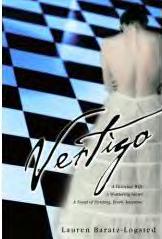For those of you that missed the two-part inteview with Lauren Baratz-Logsted, here it is in its entirety! Lauren has some wonderful insights on writing and navigating the waters of the publishing industry.
You can visit her website at http://www.laurenbaratzlogsted.com, as well as her myspace page at http://www.myspace.com/laurenbaratzlogsted.
*****
Lauren Baratz-Logsted is the author of several novels including How Nancy Drew Saved My Life. She is also the editor of the critically acclaimed This is Chick-Lit, a response to the collection This is NOT Chick-Lit.
Other critically acclaimed books include Vertigo (Bantam), which has been called an “erotic literary thriller” and Angel’s Choice (Simon and Schuster), her first YA novel.
(Click the books to purchase)


In this two-part interview Lauren discusses her recent work as well as her journey to becoming a published author. She offers insight into navigating the sometimes choppy waters of the publishing industry and gives authors tips on how to build a successful career.
Sit back, relax, and enjoy:
Interview with Lauren Baratz-Logsted

NG: You started writing when you were twelve. Can you tell us a little about how you started and why you continued to write?
Lauren: My English teacher gave us an assignment to write a story using three seemingly unconnected characters: a priest, a nurse, and a camel. I wrote a torrid Thorn Birds type of story where they were stuck on a desert isle, the camel was injured, and the priest fell in love with the nurse, renouncing his vows and grabbing her in a clinch as the camel was airlifted to safety in a helicopter. I guess my teacher liked it because he made the class listen to it three days running. This probably made the other students hate me a bit by that third day, but it was the first glimmering I had that maybe I could tell stories people wanted to hear. I guess that’s why I still write: I have stories to tell and, at least so far, people want to hear them.
NG: What is one thing people should know about your work?
Lauren: That each book is different, whether in voice or theme. The Thin Pink Line (contemporary comedy about a whacky woman faking a pregnancy); Vertigo (Victorian erotic suspense about the negative effects of a claustrophobic society); Angel’s Choice (contemporary serious Young Adult novel about teen pregnancy) – just to name three. The only thing they have in common is they have the same author’s name on each spine.
NG: Do you have any upcoming projects in the works?
Lauren: As far as I know I have two books coming out in 2007: my next comedy for adults, Baby Needs a New Pair of Jimmy Choos, about a window washer who suffers from having an addictive personality; and my second YA, currently called Hailing My Life, about a girl whose novelist mother is crushed to death by a stack of Harry Potter books, so her father moves them to CT where she becomes embroiled in a mystery involving on an online sex predator. In 2008 I’ll have my first tween book out about a 12-year-old who is conflicted about her gorgeous breasts.
NG: Both you and your spouse are writers. Has being in the same profession added to the quality of your relationship?
Lauren: Absolutely. For years we’ve had a six-member group of writers that meets around our table one night a week to share our work and drink wine. He’s been very supportive of my career and, I swear, I’m more excited about his first published book coming out in 2008 than I have been for any of mine. It’s called Sock Puppets in Love. It’s about a thirteen-year-old boy whose father died the previous semester and whose gorgeous new English teacher has now set her eye on him. Greg and I also used to wash windows together in his window-washing business, so there’s that too.
NG: Your novel, Vertigo, is set at the turn of the 20th century. Being that it’s a period piece, how have readers so far related to the story and characters presented in the book?
Lauren: The response has been extremely positive. The Boston Globe compared it favorably to the work of British best-selling suspense writer Ruth Rendell – be still, my heart! – and readers keep writing to ask for a sequel. What writer can ask for more?
NG: You edited and contributed to an anthology called This is Chick-Lit. How has the backlash against the chick-lit label influenced your writing and marketing efforts?
Lauren: It’s made me feel almost militantly protective of Chick-Lit; that’s said with a smile, by the way. Having been in this business for nearly 24 years – first as a bookseller, then as a reviewer and editor, now as a published author – I’ve never seen any other genre consistently swiped at the way Chick-Lit is. Like any genre, or literary fiction, Chick-Lit has its great books, its so-so books and its lousy books. I don’t know that it’s affected my marketing generally, though. My two most recent books, Vertigo (the Victorian literary suspense novel), and Angel’s Choice (the serious YA) aren’t Chick-Lit at all. And it’s never influenced my writing. I write the stories I want to write, with all my many voices, and leave it to publishers to decide how to position the individual books.
NG: How difficult was it for you to publish your first book?
Lauren: Very! I left my day job as an independent bookseller in 1994. It took me nearly eight years to sell a book and the first book I sold was actually the sixth I’d written. But when I hit, it was sweet. The Thin Pink Line was sold as part of a two-book deal, was published in 10 countries, and I’ve had six more books published since with more to come.
NG: What pitfalls have you managed to overcome and how would you advise other authors to steer clear of the same?
Lauren: Every path is different. I guess the thing that’s hindered me the most have been the times I’ve signed with agents who failed to further my career. But how can you advise others against that? They were all reputable agents with many successes to their names; they just weren’t the right agents for me. I would also tell authors to stop and think before posting things on the Internet. I’m 44 and am fully aware of the potential negative consequences of speaking my mind in public. And I do speak my mind. But every now and then I’ll stumble across some writer mouthing off in cyberspace and for whatever reason my radar goes up and I realize this person has no idea what kind of negatives they’re racking up.
NG: What would you tell writers that are just starting out and don’t know much about getting a book published?
Lauren: That knowledge is power, every step of the way. And the best place I know on the Web to gain knowledge and network is Backspace. It’s a community of 400+ writers and publishing professionals. I wish there had been such a thing when I was first starting out. There is a small yearly subscription fee but it’s well worth it for anyone serious about a career in writing. Oh, and my other big advice? Read, read, read. You have no idea how many people I meet who want to be writers and then tell me they don’t have time to read. To me, that’s like wanting to be a surgeon and refusing to take science.
NG: As a writer, what have been some of your most memorable experiences in the industry, good and bad?
Lauren: Bad first: When Princess Diana died just after I’d started submitting an alternate-universe romantic comedy I’d written called Falling for Prince Charles. A month after her death, a VP at one of the biggest publishing houses in the country called to tell me she loved my book and that she couldn’t buy it, that nobody could. A year’s worth of my life and my work, and it was unpublishable. Best? I guess I’ll stick with the royalty theme. The editor who worked on The Thin Pink Line heard Fergie, the Princess of York, was coming to NY to pitch a possible book project and that they’d be having lunch, so she brought my book along as a present figuring Fergie would like it. I have no idea if she ever read it – it probably wound up in the trash – but it’s fun to think someone famous might actually read one of my humble efforts.
NG: Any thing else you would like to add for would-be authors?
Lauren: It’s always the same from me. Stay alive, keep putting one writing foot in front of the other, and always remember: the only person who can ever really take you out of the game is you.
*****
I hope you found some useful insights for your writing and publishing endeavors!
Lauren Baratz-Logsted: http://www.laurenbaratzlogsted.com
Nancy O. Greene: http://www.portraits.bravehost.com
Read Full Post »














You must be logged in to post a comment.